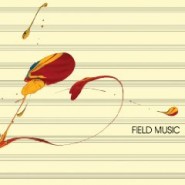 Field Music
Field MusicField Music (Measure)
Score: 19
English band Field Music released its newest album this past week. Field Music (Measure), a long (20 track, 70 minute) album is a collection of mostly unrelated tracks with the common theme of being incredibly repetitive and for the most part, vastly uninteresting. The album has some fairly strong tracks, but a few among a full score is simply not enough to give Field Music (Measure) a score that is anywhere near decent.
One of the most instantly recognizable features of tracks on Field Music (Measure) is that they are nothing like their preceding track, and as a result, Field Music (Measure) is diverse to a fault. It’s hard to find any sort of connection between neighboring tracks, let alone a sense of direction for the album as a whole, when a atmospheric, somewhat dark track is followed by a typical indie-folk track, or when that indie-folk track gives way to, say, one that sounds like Steely Dan, or perhaps another that, at least early on, resembles The White Stripes. But tracks taken individually can, on rare occasion, sound reasonably good; one example of this is “All You’d Ever Need to Say,” which easily has the most interesting, most able to stand up to endless repetition, backbone on the album.
Vocally, Field Music (Measure) is quite variable. On the best tracks, the vocals are among the most creative elements. On weaker tracks, they tend to sound quite generic. This variability through the album isn’t surprising, given its length. However, it certainly contributes to the album’s inability to maintain a decent level of quality all the way through. It would be great if the Of Montreal-esque falsetto harmonies that distinguish “Let’s Write a Book” showed up again during Field Music (Measure), but Field Music seems generally to discard such creative ideas far too quickly in favor of more generic indie/rock vocals.
Field Music (Measure) proves that Field Music is quite capable of interlacing interesting ideas and images through their music, even on such a drawn-out album as this. The degree to which the lyrics complement the music is quite impressive as Brewis sings of being “Close enough / In the mirror” on “In the Mirror“ ‘s dark opening to Field Music (Measure), and, at least for the first part of the album (and select parts of the later sections) this continues. However, on the duller tracks there’s not much to work for, and so no matter what Field Music has written, it doesn’t have much opportunity to stand out.
The overwhelming majority of the problems in Field Music (Measure) lie in the vast amounts of repetition and lengthiness. Most of Field Music’s tracks have one main section, containing a highly repetitive, overly dominant backbone that can range from electric guitar lines to the uniform plunking of single keyboard keys. The obvious problems that occur with what can, perhaps, be best described as a tedious dirge are magnified exponentially in the face of such an enormous album (note that not one of the 20 tracks is shorter than two minutes). By the halfway point it feels as if the album should be ending, and the second half of the album is actually somewhat painful. The final blow the album delivers is, naturally, the final track, which spans nearly 10 minutes. Of course, a ten minute final track seems to be more an ideal that Field Music decided to uphold than an actual usable concept, as (the appropriately named, for the final track) “It’s About Time” has barely any workable material. The first half consists of random fragmented violin notes, the track continues on to a long section of complete silence, and the final part of the track has arbitrary ambient recordings.
First and foremost, Field Music (Measure) should not have twenty tracks. Quite simply, it can’t sustain itself for that long, which is a pity as the album’s few best parts aren’t bad. Those good sections explore a variety of musical styles and directions; however, these are entirely overshadowed by the large number of generic tracks, and so Field Music (Measure) doesn’t even meet up to the standard of mediocre. There are interesting bits here and there - but to get to them, you’ll have to slog through over an hour of alternating tedium and repetition.
This post is tagged 10-19, Field Music